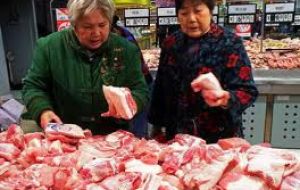MercoPress. South Atlantic News Agency
China hikes bank reserves to contain inflation; food costs up 11.7% in May
 The price of pork has soared 40% in the last twelve months
The price of pork has soared 40% in the last twelve months China's central bank raised bank reserve ratios on Tuesday for the ninth time since October to try to curb inflation, which is running at its fastest pace in almost three years.
The central bank move came just hours after data showed that consumer inflation, largely fuelled by high food prices (11.7%), rose in May to 5.5%, a 34-month high, according to the National Bureau of Statistics.
The 50 basis-point increase in the reserve ratio requirement (RRR) means that big banks have to put aside 21.5% of their deposits, a record high, blocking funds that could otherwise be loaned out and so fuel inflation. Nevertheless industrial output and retail sales for May were largely in line with expectations.
Even when food prices are stripped out (pork prices soared 40% in May over a year ago), inflation was 2.9% in May, the highest level since records began in 2002 and a sign that price pressures are spreading in the economy.
Chinese leaders have made bringing inflation under control their top priority this year, fearful that rising prices could not only unsettle the world's second-biggest economy but spark social unrest of the sort seen this week in southern China.
While the RRR increase was the ninth since October, the central bank has also raised interest rates four times over the same period to try to achieve average inflation this year of 4%.
Many analysts doubt that target can be achieved with average inflation in the first five months of 2011 already running at 5.2%. Indeed, analysts expect inflation to rise to around 6% in June, adding to doubts the target can be met and suggesting further monetary policy tightening may be needed.
The reserves ratio increase takes effect on June 20, the central bank said on its website. It draws 380 billion Yuan out of the banking system, analysts estimated, although they expect 601 billion Yuan to enter the system in June from maturing bills and repurchase agreements.
Earlier, a flurry of data, including inflation and industrial output, suggested economic growth was slowing down, but not too quickly, relieving concerns that the world's second-biggest economy was heading for a hard landing.
China provided one of the few areas of growth during the 2008/09 global financial crisis, which is seen as still critical while Europe, the United States and Japan struggle to shake off the affects of downturn.
The central bank's one-year lending rate is 6.31% and one-year deposit rate is 3.25%. Producer prices rose 6.8% from a year earlier; industrial output in May rose 13.3% from a year earlier, the slowest pace since November, but exposed to the summer power shortages.
May retail sales rose 16.9% from a year earlier, while fixed-asset investment between January and May rose 25.8% from a year earlier. Real estate investment rose 34.6% in the first five months of 2011 from a year earlier, compared with a rise of 34.3% in the first four months. China's economy expanded in 2010 by 10.3%, a pace that slowed in the first quarter to 9.7%.




Top Comments
Disclaimer & comment rulesCommenting for this story is now closed.
If you have a Facebook account, become a fan and comment on our Facebook Page!